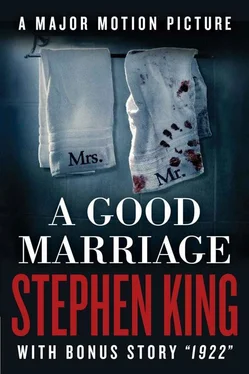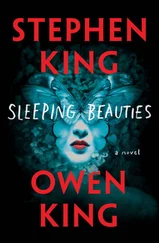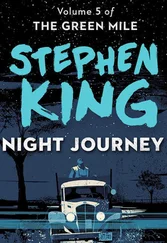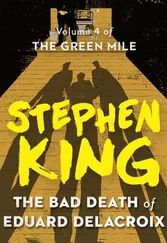“Pants’re good for traveling in, though, aren’t they? Man or woman, pants are good for traveling. And a woman might choose them. If she was in a hurry, that is.”
“I suppose.”
“She took her good jewelry and her picture of Nana and Pop-Pop,” Henry said from behind us. I jumped a little; I’d almost forgotten he was there.
“Did she, now? Well, I suppose she would.”
He took another flick through the clothes, then closed the closet door. “Nice room,” he said, trudging back toward the hall with his Stetson in his hands. “Nice house . Woman’d have to be crazy to leave a nice room and a nice house like this.”
“Mama talked about the city a lot,” Henry said, and sighed. “She had the idea of opening some kind of shop.”
“Did she?” Sheriff Jones regarded him brightly with his green cat’s eyes. “Well! But a thing like that takes money, doesn’t it?”
“She’s got those acres from her father,” I said.
“Yes, yes.” Smiling bashfully, as if he’d forgotten those acres. “And maybe it’s for the best. ‘Better to be living in a wasteland than with a bitter-tongued, angry woman.’ Book of Proverbs. Are you glad she’s gone, Son?”
“No,” Henry said, and tears overspilled his eyes. I blessed each one.
Sheriff Jones said, “There-there.” And after offering that perfunctory comfort, he bent down with his hands braced on his pudgy knees, and looked under the bed. “Appears to be a pair of woman’s shoes under there. Broke in, too. The kind that would be good for walking. Don’t suppose she ran away barefooty, do you?”
“She wore her canvas shoes,” I said. “Those are the ones that are gone.”
They were, too. The faded green ones she used to call her gardening shoes. I’d remembered them just before starting to fill in the well.
“Ah!” he said. “Another mystery solved.” He pulled a silver-plated watch from his vest pocket and consulted it. “Well, I’d better get on the roll. Tempus is fugiting right along.”
We went back through the house, Henry bringing up the rear, perhaps so he could swipe his eyes dry in privacy. We walked with the Sheriff toward his Maxwell sedan with the star on the door. I was about to ask him if he wanted to see the well—I even knew what I was going to call it—when he stopped and gave my son a look of frightening kindness.
“I stopped at the Cotteries’,” he said.
“Oh?” Henry said. “Did you?”
“Told you these days I have to water just about every bush, but I’ll use a privy anytime there’s one handy, always assuming folks keep it clean and I don’t have to worry about wasps while I’m waiting for my dingus to drip a little water. And the Cotteries are clean folks. Pretty daughter, too. Just about your age, isn’t she?”
“Yes, sir,” Henry said, lifting his voice just a tiny bit on the sir .
“Kind of sweet on her, I guess? And her on you, from what her mama says.”
“Did she say that?” Henry asked. He sounded surprised, but pleased, too.
“Yes. Mrs. Cotterie said you were troubled about your own mama, and that Shannon had told her something you said on that subject. I asked her what it was, and she said it wasn’t her place to tell, but I could ask Shannon. So I did.”
Henry looked at his feet. “I told her to keep it to herself.”
“You aren’t going to hold it against her, are you?” Sheriff Jones asked. “I mean, when a big man like me with a star on his chest asks a little thing like her what she knows, it’s kind of hard for the little thing to keep mum, isn’t it? She just about has to tell, doesn’t she?”
“I don’t know,” Henry said, still looking down. “Probably.” He wasn’t just acting unhappiness; he was unhappy. Even though it was going just the way we had hoped it would.
“Shannon says your ma and your pop here had a big fight about selling those hundred acres, and when you came down on your poppa’s side, Missus James slapped you up pretty good.”
“Yes,” Henry said colorlessly. “She’d had too much to drink.”
Sheriff Jones turned to me. “Was she drunk or just tiddly?”
“Somewhere in between,” I said. “If she’d been all the way to drunk, she would have slept all night instead of getting up and packing a grip and creeping away like a thief.”
“Thought she’d come back once she sobered up, did you?”
“I did. It’s over four miles out to the tarvy. I thought for sure she’d come back. Someone must have come along and given her a ride before her head cleared. A trucker on the Lincoln-Omaha run would be my guess.”
“Yep, yep, that’d be mine, too. You’ll hear from her when she contacts Mr. Lester, I’m sure. If she means to stay out on her own, if she’s got that in her head, she’ll need money to do it.”
So he knew that, too.
His eyes sharpened. “Did she have any money at all, Mr. James?”
“Well…”
“Don’t be shy. Confession’s good for the soul. The Catholics have got hold of something there, don’t they?”
“I kept a box in my dresser. There was 200 dollars put by in it, to help pay the pickers when they start next month.”
“And Mr. Cotterie,” Henry reminded. To Sheriff Jones, he said: “Mr. Cotterie has a corn harvester. A Harris Giant. Almost new. It’s a pip.”
“Yep, yep, saw it in his dooryard. Big bastid, isn’t it? Pardon my Polish. Money all gone out’n that box, was it?”
I smiled sourly—only it wasn’t really me making that smile; the Conniving Man had been in charge ever since Sheriff Jones pulled up by the chopping block. “She left twenty. Very generous of her. But twenty’s all Harlan Cotterie will ever take for the use of his harvester, so that’s all right. And when it comes to the pickers, I guess Stoppenhauser at the bank’ll advance me a shortie loan. Unless he owes favors to the Farrington Company, that is. Either way, I’ve got my best farmhand right here.”
I tried to ruffle Henry’s hair. He ducked away, embarrassed.
“Well, I’ve got a good budget of news to tell Mr. Lester, don’t I? He won’t like any of it, but if he’s as smart as he thinks he is, I guess he’ll know enough to expect her in his office, and sooner rather than later. People have a way of turning up when they’re short on folding green, don’t they?”
“That’s been my experience,” I said. “If we’re done here, Sheriff, my boy and I better get back to work. That useless well should have been filled in three years ago. An old cow of mine—”
“Elphis.” Henry spoke like a boy in a dream. “Her name was Elphis.”
“Elphis,” I agreed. “She got out of the barn and decided to take a stroll on the cap, and it gave way. Didn’t have the good grace to die on her own, either. I had to shoot her. Come around the back of the barn I’ll show you the wages of laziness with its damn feet sticking up. We’re going to bury her right where she lies, and from now on I’m going to call that old well Wilfred’s Folly.”
“Well, I would, wouldn’t I? It’d be somethin’ to see. But I’ve got that bad-tempered old judge to contend with. Another time.” He hoisted himself into the car, grunting as he did so. “Thank you for the lemonade, and for bein’ so gracious. You could have been a lot less so, considering who sent me out here.”
“It’s all right,” I said. “We all have our jobs.”
“And our crosses to bear.” His sharp eyes fastened on Henry again. “Son, Mr. Lester told me you were hidin’ something. He was sure of it. And you were, weren’t you?”
“Yes, sir,” Henry said in his colorless and somehow awful voice. As if all his emotions had flown away, like those things in Pandora’s jar when she opened it. But there was no Elphis for Henry and me; our Elphis was dead in the well.
Читать дальше











